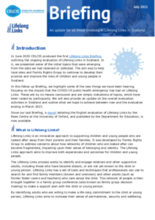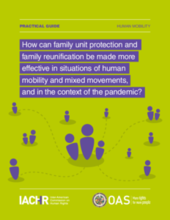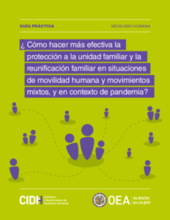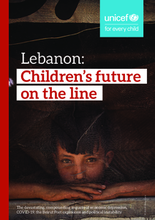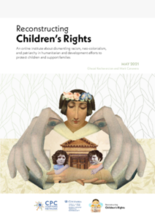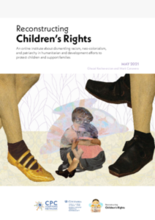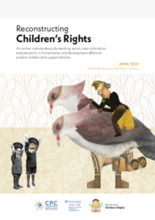Displaying 51 - 60 of 498
In June 2020 CELCIS produced the first Lifelong Links Briefing, outlining the ongoing evaluation of Lifelong Links in Scotland. In it, we presented some of the initial topics that were emerging from the data we had received or collected. The aim was to help local sites and Family Rights Group to continue to develop their practice and improve the lives of children and young people in Scotland.
he Inter-American Commission on Human Rights (IACHR) has issued, in collaboration with the UN Refugee Agency (UNHCR), a practical guide on how to protect family unity and reunification more effectively in human mobility and mixed movement contexts during the ongoing COVID-19 pandemic. This publication is part of a series of guides issued by the IACHR to address the impact of the pandemic on human rights. The guide makes recommendations to States, so they may protect family unity, prevent separation, and take any necessary measures to ensure the reunification of families who may have been separated in contexts associated with human mobility.
la Comisión Interamericana presenta la guía ¿Cómo hacer más
efectiva la protección a la unidad familiar y reunificar a la familia en los procedimientos migratorios y de protección en contexto de pandemia? en la que
se analizan los estándares interamericanos aplicables a la luz de las obligaciones
internacionales de los Estados y propone recomendaciones para garantizar la unidad
familiar y la reunificación familiar así como prevenir los riesgos de separación y minimizar los impactos en los casos de separación familiar. Asimismo, la implementación
de las garantías de la reunificación familiar requiere muchas veces de una estrategia idónea de acceso a mecanismos de regularización documental, así como de condiciones seguras de viaje y movilidad a través de las fronteras nacionales. Esto es especialmente benéfico para familias que se han visto separadas de manera forzada o por
razones asociadas a la movilidad humana.
This rapid assessment from UNICEF explores the devastating, compounding impacts of economic depression, COVID-19, the Beirut Port explosions and political instability on children in Lebanon.
The goal of the Reconstructing Children’s Rights Institute is to raise awareness and recognition of how racism, patriarchy, and power permeate the international child rights and child protection field. Building on Conversation #1, this session expands our political imagination by delving deeper into the international children’s rights and child protection space.
This session’s speakers discussed the funding ecosystem’s challenges and barriers and highlighted examples of how innovative funding mechanisms are reinventing donor giving by shifting resources and power closer to the children, young people, families, and communities they are meant to support.
The Ngulluk Koolunga Ngulluk Koort (Our Children Our Heart) project conducted extensive Elder and community consultation to develop principles and practice recommendations for child protection governance in Western Australia. The authors of this paper explore these principles and practice recommendations and highlight the need for culturally safe community consultation and governance with a focus on repairing damage incurred by the Aboriginal and Torres Strait Islander community from past child protection policies.
The goal of the Reconstructing Children’s Rights Institute is to raise awareness and recognition of how racism, patriarchy, and power permeate the international child rights and child protection field. This first conversation examines the larger ecosystems of international development, humanitarian aid, international relations, and peace and security, and unpacks the colonial vestiges and power imbalances intrinsic to these larger contexts.
This article examines pilot results for the culturally adapted Weaving Healthy Families (WHF) program to promote resilience and wellness while preventing substance abuse and violence among Native American (NA) families.
This research focuses on Somalis living in a large English city where there is a significant shortage of Somali foster carers and adopters despite people of Somali heritage comprising a sizeable proportion of the care and city population.

